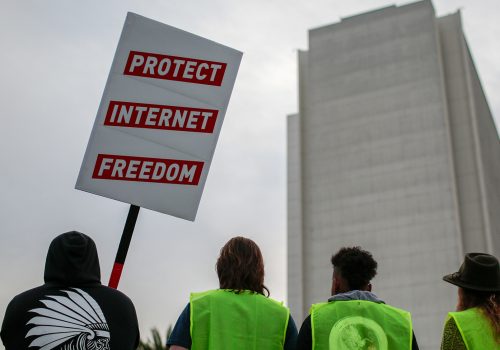Event transcript
Speakers
David Morrison
Deputy Foreign Minister, Global Affairs, Canada
Anne Neuberger
Deputy National Security Advisor, Cyber & Emerging Technologies, National Security Council, The White House
DAVID MORRISON: Hi, everyone. I… want to commend the Atlantic Council for putting together such a timely event and in particular for organizing this important session on the Freedom Online Coalition.
I think we are all united by the belief that one of the most pressing challenges of our time is how we can benefit from digital technology in ways that protect human rights and uphold our shared democratic values. It is clear to us here in Canada that the FOC, the only multilateral coalition committed to building a future where digital progress benefits everyone, has a big role to play in answering this challenge. As 2022 chair of the FOC, Canada is proud to have advanced our collective vision of democracy in the digital age grounded in digital inclusion.
There are four essential components to digital inclusion: connectivity, digital literacy, civic participation, and safety online—greater connectivity to bridge digital divides worldwide and within our societies; digital literacy to ensure users are empowered to navigate diverse content online; civic participation free from hate speech and disinformation, unduly restrictive censorship, internet shutdowns, and other oppressive practices; and building a safe online ecosystem for all.
Collectively advancing digital inclusion allows us to imagine and begin to advance a world where digital progress benefits everyone. The Freedom Online Coalition is an ideal vehicle for this collective action. It is driven by likeminded democracies and powered by civil society, industry, and academic expertise through the active Advisory Network. The strength of our collective action has demonstrated that amidst democratic decline and rising digital authoritarianism the FOC continues to play a pivotal role in promoting a human rights-based approach to the governance of digital technologies and the internet.
Since assuming the role of chair of the FOC in January 2022, Canada has led the coalition’s efforts to advance digital inclusion by shaping global norms through diplomatic coordination and multistakeholder engagement through our ambitious twenty-three-commitment Program of Action. We have advanced our vision in several other ways.
First we’ve actively worked to affirm and shape global norms by strengthening and expanding diplomatic networks in Paris, Geneva, and New York to share information, coordinate positions, and advance strategies to promote internet freedom and human rights online in priority forums Whether it was calling out Russia’s state-sponsored disinformation in Ukraine or drawing attention to internet shutdowns taking place in Iran, we’ve shone light on egregious situations around the world that undermine human rights and fundamental freedoms online.
Second, Canada has been committed to enhancing the FOC’s visibility and presence. We launched the #MyDigitalInclusion social-media campaign to highlight the importance of advancing digital inclusion, which has since reached an estimated audience of thirteen million in over fifty countries. This has also made this past year the FOC’s most active year on social media.
Third, Canada has been working to develop the Ottawa Agenda for Digital Inclusion this year. This was done in part by hosting consultations around the world to gather insights about challenges to internet freedom and best ways forward. If we are to counter the greatest digital threats facing democracy today, to defend internet freedom, and push back against digital authoritarianism, we are going to need a collective response—one rooted in multilateralism and multistakeholder engagement. These are the foundations that have informed the Ottawa Agenda. I am pleased that as we finish our chairship of the FOC we will launch the Ottawa Agenda in January. And working closely with the US as the next chair of the FOC, this agenda will forge a pathway forward for the promotion of internet freedom over the course of the coming decade to work together towards a rules-based, democratic, and digitally inclusive world.
Finally, we are committed to growing our networks and welcoming new members. We are thrilled that Chile has joined the FOC as its thirty-fifth member and that Taiwan has expressed interest in joining as an observer to the coalition.
Canada’s chairship may be coming to a close, but we will continue to support the FOC’s mission to protect human rights online. We look forward to working closely with the US as they assume the role of chair of the coalition in 2023. We are thrilled to see the US retaining the Digital Inclusion Framework and its commitment to continue the work of bolstering the FOC’s capacity to make it an effective, action-oriented coalition. We are delighted that our US colleagues have supported the Ottawa Agenda through its development this year and have committed to advance it through their chairship next year.
I don’t think I have to remind this audience that the governance of digital technologies is already a crucial geopolitical arena that will significantly impact the future of our democracies. The Freedom Online Coalition gives us a platform to act. So, to everyone present, let us prioritize restoring trust in the digital space. Let us continue to put people first. And, together, let’s keep building a better future for all. Thank you very much.
ANNE NEUBERGER: Hello, and greetings from the White House. My name is Anne Neuberger, and I am the US deputy national security adviser for cyber and emerging technologies. It’s a pleasure to join you all today, albeit virtually.
My thanks to the Atlantic Council for hosting this important event. Today’s discussion is particularly timely, as next month the United States will become chair of the Freedom Online Coalition of the FOC for the first time in the body’s eleven-year history. We in the White House are excited to build on Canada’s terrific work as the current FOC chair, and to advance the efforts of our fellow members of the FOC and the broader internet freedom community.
From President Biden down, the US government is committed to strengthening the institution’s vital work as a critical part of the administration’s overall support to internet freedom and promoting respect for human rights online. In fact, we’re excited that Chile joined the FOC as its thirty-fifth member last week. As part of President Biden’s commitment to expand the Freedom Online Coalition, we look forward to welcoming additional members in the coming months.
Before I outline our priorities for our term as chair, let me take a step back and provide some broader context. When the Freedom Online Coalition launched in 2011, we lived in a time of high expectations around the liberalizing power of information and communication technologies. The number of internet users had grown exponentially throughout the prior decade. Social media revolutions had galvanized the democratic aspirations of millions around the world. The immense promise of the internet as a single interconnected communications system for all of humanity heralded unimaginable innovations, unfettered access to knowledge, and truly unprecedented economic opportunities for billions of people.
The Freedom Online Coalition was created to protect the promise of this network of networks, and in the intervening decade has become a unique international multistakeholder effort to support internet freedom and promote respect for human rights online. And over the past 11 years, many aspects of what we thought would be the internet’s promise have indeed been realized or, even in some cases, surpassed when it comes to commerce, learning, connection, and beyond. And yet, the transformative impact of the internet has included, as we all know, a series of troubling developments.
The internet remains a critical tool for those on the frontlines of the struggle for human rights. Activists and everyday people from Tehran to Shanghai to St. Petersburg depend on access to an unblocked, unfiltered internet to communicate and gain information otherwise denied to them by their governments. But the promise of digital technologies has become paired with concerns about the peril posed by their misuse to repress, including by governments trying to control populations, to stifle dissent and to surveil and censor. That is one of the reasons this thirty-five-member coalition is so vital.
Through the FOC, we’ve joined with our partners to speak out against threats to human rights online, including in response to Russia’s unprovoked and unjust war against Ukraine, to compare lessons learned in our individual and joint efforts to provide support for internet freedom in contexts where it is under attack, and evaluate what more we can do to support those individuals, such as human-rights defenders and activists who are most under threat. These efforts are important, and we’ve seen concrete results from them. But in each year over the past decade, global internet freedom has declined.
With each passing year, the internet has grown more closed, more insecure, and more fractured as governments and nongovernmental actors alike exploit emerging digital technologies to find new ways to violate human rights and fundamental freedoms. Additionally, we recognize the profoundly chilling effect of targeted online harassment and abuse we’re seeing on women and girls, LGBTQI+ individuals, and other marginalized groups, which undermines their ability to exercise their human rights, including their right to freedom of expression, compounding the forms of violence they face online, and exacerbating the digital divide.
In short, we’re at an inflection point. As the FOC enters is second decade, we must acknowledge that the same strategies and tactics we’ve used previously to advance our affirmative democratic vision for the internet, one that’s open, free, global, interoperable, reliable, and secure, must also evolve to meet this moment. The United States is committed to leading these efforts, in partnership with likeminded governments, civil society, industry, and other stakeholders. And the Biden-Harris administration has prioritized protecting and defending human rights online worldwide, and strengthening democratic norms, values, and institutions in an increasingly digital age.
That’s why at the first Summit for Democracy in December 2021, President Biden committed to not only expand the FOC’s membership, but also to deepen the coalition’s diplomatic efforts to address the challenges and opportunities of digital technologies. And it is why in April the United States, together with over sixty other countries, launched the Declaration for the Future of the Internet, which aligns with the principles of the Freedom Online Coalition, and reaffirmed our commitment to protecting human rights online and ensuring all people can enjoy the advancement and benefit that technological development can deliver.
As we move forward with operationalizing the DFI, we’re also putting our words into action as the chair of the FOC for 2023. Over the next year, we will pursue three priorities to help achieve our long-term vision. First, we will bolster existing efforts where the FOC adds unique value. In October of this year, the FOC issued a statement addressing the Iranian government’s internet shutdowns as part of its wider crackdown on protesters and aligned with the Iranian government’s longstanding pattern of censorship. This was a first for the FOC, and we will continue to call out governments when they misuse technology against their own people.
Second, we will strengthen coordination between the FOC’s policies and the foreign assistance that participating states are providing in support of national-level technology frameworks around the globe’s alignment with human rights. Third, we will strengthen the FOC through improved operating mechanics, the nuts and bolts of what makes an international coalition effective and efficient, to make sure the FOC is set up for greater impact for years to come. We plan to work closely with past and future chairs to strengthen continuity year to year and improve our strategic planning.
But we’re not just focused on the FOC’s day-to-day process. We also intend to further bolster the coalition’s policy work on a number of fronts. We’ll remail laser-focused on the FOC’s mission to protect fundamental freedoms, including through countering network disruptions. To bolster this work, we will look to improve and increase our support to efforts that increase access to the internet and fact-based information globally.
We will focus on countering the rise of digital authoritarianism, and the misuse of digital technologies. The administration has already taken concrete steps to counter the proliferation of commercial spyware and misuse of surveillance technologies. We will ensure a dedicated focus on emerging technologies, namely with respect to enabling the responsible development and use of artificial intelligence in ways that respect human rights and allow all members of humanity to benefit from the incredible potential development of these technologies.
We will continue our focus on strengthening digital inclusion to include efforts to support online initiatives, to promote safe online spaces, particularly for women and girls, LGBTQI+ persons, persons with disabilities, and other marginalized groups. We look forward to working with you all in the coming months to develop new ideas for the FOC and strengthen it as an institution. Thank you and be well.
Related content
See full event
Image: A person has a mobile phone in his hand, on which he is asked for the consent of cookies in the browser on a website. Photo via Mohssen Assanimoghaddam/Reuters




